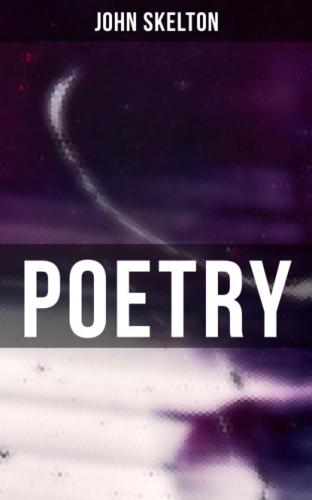Dyuysed by Skelton after the funerall rate;
Yet sum there be therewith that take greuaunce,
And grudge therat with frownyng countenaunce;
But what of that? hard it is to please all men;
Who list amende it, let hym set to his penne.”[94]
That a portion of the following passage in Barclay’s Fourth Egloge was levelled at Skelton, appears highly probable;
“Another thing yet is greatly more damnable:
Of rascolde poetes yet is a shamfull rable,
Which voyde of wisedome presumeth to indite,
Though they haue scantly the cunning of a snite;[95]
And to what vices that princes moste intende,
Those dare these fooles solemnize and commende.
Then is he decked as Poete laureate,
When stinking Thais made him her graduate:
When Muses rested, she did her season note,
And she with Bacchus her camous[96] did promote.
Such rascolde drames, promoted by Thais,
Bacchus, Licoris, or yet by Testalis,
Or by suche other newe forged Muses nine,
Thinke in their mindes for to haue wit diuine;
They laude their verses, they boast, they vaunt and iet,
Though all their cunning be scantly worth a pet:
If they haue smelled the artes triuiall,
They count them Poetes hye and heroicall.
Such is their foly, so foolishly they dote,
Thinking that none can their playne errour note:
Yet be they foolishe, auoyde of honestie,
Nothing seasoned with spice of grauitie,
Auoyde of pleasure, auoyde of eloquence,
With many wordes, and fruitlesse of sentence;
Unapt to learne, disdayning to be taught,
Their priuate pleasure in snare hath them so caught;
And worst yet of all, they count them excellent,
Though they be fruitlesse, rashe and improuident.
To such ambages who doth their minde incline,
They count all other as priuate[97] of doctrine,
And that the faultes which be in them alone,
Also be common in other men eche one.”[98]
In the Garlande of Laurell we are told by Skelton, that among the famous writers of all ages and nations, whom he beheld in his vision, was
“a frere of Fraunce men call sir Gagwyne,
That frownyd on me full angerly and pale;”[99]
and in the catalogue of his own writings which is subsequently given in the same poem, he mentions a piece which he had composed against this personage,
“The Recule ageinst Gaguyne of the Frenshe nacyoun.”[100]
Robert Gaguin was minister-general of the Maturines, and enjoyed great reputation for abilities and learning.[101] He wrote various works; the most important of which is his Compendium supra Francorum gestis from the time of Pharamond to the author’s age. In 1490 he was sent by Charles the Eighth as ambassador to England, where he probably became personally acquainted with Skelton.
That Skelton composed certain Latin verses against the celebrated grammarian William Lily, we are informed by Bale,[102] who has preserved the initial words, viz.
“Urgeor impulsus tibi, Lilli, retundere:”
and that Lily repaid our poet in kind, we have the following proof;
“Lilii Hendecasyllabi in Scheltonum ejus carmina calumniantem. [103]
“Quid me, Scheltone, fronte sic aperta
Carpis, vipereo potens veneno?
Quid versus trutina meos iniqua
Libras? dicere vera num licebit?
Doctrinæ tibi dum parare famam
Et doctus fieri studes poeta,
Doctrinam nec habes, nec es poeta.”
It would seem that Skelton occasionally repented of the severity of his compositions, and longed to recall them; for in the Garlande of Laurell, after many of them have been enumerated, we meet with the following curious passage;
“Item Apollo that whirllid up his chare,
That made sum to snurre and snuf in the wynde;
It made them to skip, to stampe, and to stare,
Whiche, if they be happy, haue cause to beware
In ryming and raylyng with hym for to mell,
For drede that he lerne them there A, B, C, to spell.
With that I stode vp, halfe sodenly afrayd;
Suppleyng to Fame, I besought her grace,
And that it wolde please her, full tenderly I prayd,
Owt of her bokis Apollo to rase.
Nay, sir, she sayd, what so in this place
Of our noble courte is ones spoken owte,
It must nedes after rin all the worlde aboute.
God wote, theis wordes made me full sad;
And when that I sawe it wolde no better be,
But that my peticyon wolde not be had,
What shulde I do but take it in gre?
For, by Juppiter and his high mageste,
I did what I cowde to scrape out the scrollis,
Apollo to rase out of her ragman rollis.”[104]
The piece which commenced with the words “Apollo that whirllid vp his chare,” and which gave such high displeasure to some of Skelton’s contemporaries, has long ago perished—in spite of Fame’s refusal to erase it from her books!
The title-page of the Garlande of Laurell,[105] ed. 1523, sets forth that it was “studyously dyuysed at Sheryfhotton Castell,” in Yorkshire; and there seems no reason to doubt that it was written by Skelton during a residence at that mansion. The date of its composition
